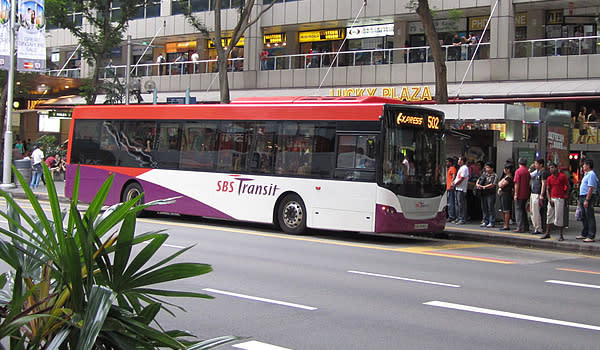NSP defends stance on multiple private operators
UPDATE
The National Solidarity Party (NSP) has defended its proposal to have multiple private operators to ply popular bus routes as a solution to Singapore's public transport woes.
In a statement to the press, Secretary-General Hazel Poa said that more buses along these routes lead to shorter waiting times, less congestion in the buses and more competitive pricing.
The NSP statement comes after Transport Minister Lui Tuck Yew said last Thursday that more competition within the public's transport industry could have negative implications for commuters in the long term.
Lui emphasised that the "cherry-picking" of lucrative routes by multiple operators could result in commuters paying higher fares, Today reported.
But Poa refuted his explanation by saying that these routes are lucrative because there is a high demand for them, and that commuters are usually packed into buses plying such places
Poa said: "Only by better meeting the needs of the commuters can we persuade more of them to forego private cars and opt instead for public transport, thereby relieving the growing congestion on our roads."
Last week, the party also proposed that bus routes should be managed by a central authority that would be in charge of granting licences to private operators, regardless of size, to run buses on any of the routes.
But Mr Lui pointed out that the two public transport operators — SBS Transit and SMRT — run a mix of profitable and loss-making routes which they are obliged to do so under their universal service obligations.
"There is a certain amount of cross-subsidy that is taking place from the profitable routes to the non-profitable routes... if you allow cherry-picking to the profitable routes — and certainly everybody who wants to run one or two buses will want to ply on those routes — then the challenge is what happens to the non-profitable routes?
"And in the end, would commuters end up having to pay more overall?"
The contestability of bus routes "is a very complicated issue" he added, and its impact on fares has to be studied.
In its proposal, NSP argued that both the People's Action Party (PAP) and Workers' Party (WP) positions fell short of commuters' needs.
"The Workers' Party proposes the nationalisation of public transport. The People's Action Party on the other hand advocates the status-quo. But it should be apparent that the status-quo is not working. The PAP needs to snap out of its complacency," Poa said.
She added that the WP's proposal to nationalise public transport however would not solve the problem of under-capacity.
It is unrealistic to expect state-run organisations, usually large and cumbersome, to be able to respond speedily to rapid changes in demand, noted Poa.
While explaining that it was not practical to expect full privatisation and competition in Mass Rapid Transit services due to the infrastructure and huge capital required, she called for partial competition to be introduced.
"The government can retain ownership of the major fixed assets — tracks, stations and trains — and sub-contract out the operations to private companies via tender," she said.
In addition, the NSP also called on the government to continue to provide subsidies for lower-income commuters, full-time students, the elderly and the disabled.


